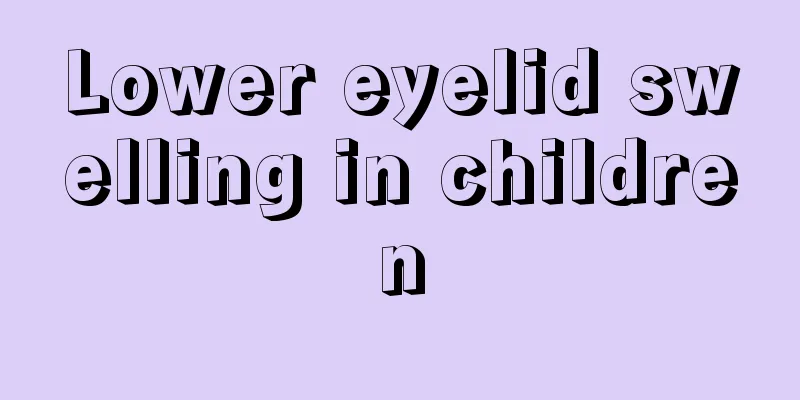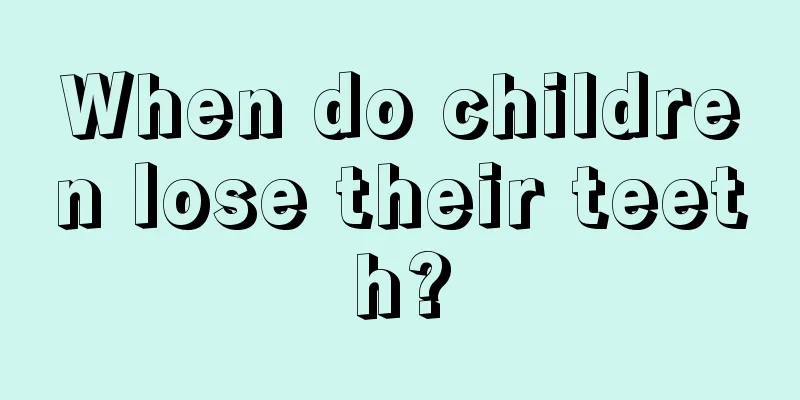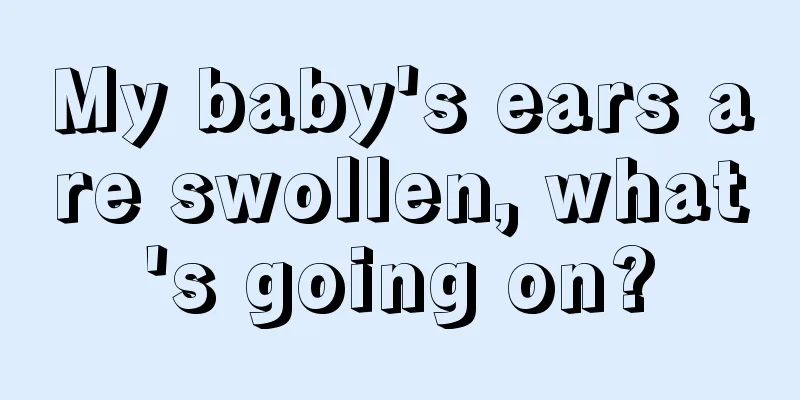Lower eyelid swelling in children

|
Generally speaking, there are many reasons for babies' lower eyelid swelling. It may be caused by endocrine disorders, calcium and zinc deficiency, or malnutrition. It is best to go to the hospital for a comprehensive examination and then treat the symptoms based on the results of the examination. Do not take medication indiscriminately without finding out the cause, otherwise it will aggravate the condition. If your baby has puffy eyes, it may be because he drinks too much water before or during bedtime, or because he does not sleep well. Drinking too much water before going to bed or having an improper sleeping posture may cause your baby's eyes to swell. As long as the baby is in good spirits and everything else is fine, there is no need to worry. This problem can be solved by trying to control the amount of water your baby drinks before going to bed and ensuring that your baby gets enough sleep. Swollen eyes may be caused by dry eyes or vitamin deficiency. Children's bones are in the process of growth and development, and they need to supplement a certain amount of vitamin D every day. For babies, it is beneficial to take an appropriate amount of cod liver oil every day (3-4 drops of concentrated cod liver oil per day). Reminder: How long to take cod liver oil depends on the physical development of the child. In addition, the dosage of cod liver oil for babies is about one-fourth of that for adults. Before taking it, you should refer to the adult dosage and doctor's instructions to choose the dosage. If the baby's condition improves, reduce the dosage in time or even stop taking the medicine. In addition, if your baby has dry eyes, you can also use some eye drops, one drop each time, twice a day. Kidney disease in children often starts with swollen eyelids. The incidence of primary nephrotic syndrome in children is relatively high, accounting for almost 20% of the hospitalization rate for urinary system diseases in children. Children with nephrotic syndrome usually have the following symptoms: Massive proteinuria: urine protein (3+, 4+), 24-hour urine protein quantity is greater than 50 mg/kg; severe edema: edema starts from the eyelids and face, gradually spreads to the whole body, edema is compressed into pits, and may be accompanied by pleural effusion, ascites and scrotal edema. Hypercholesterolemia: serum cholesterol greater than 5.7mmol/L. Hypoproteinemia: serum protein is lower than 30g/L, and lower than 25g/L in infants. Urine testing is an important way to detect whether a child has kidney disease. Children with kidney disease often have proteinuria. This is because kidney disease causes increased capillary permeability in the glomeruli, allowing protein in the body to leak from the kidneys into the urine, and a routine urine test will show positive for proteinuria. In this way, a child's kidney disease can be easily detected through a urine test. A routine urine test can intuitively reflect the functional status of the kidneys. When healthy people undergo routine urine tests, the urine protein index is usually negative. If the test results show that the urine protein is positive, it means that there is a certain lesion in the kidney. Parents should be careful at this time and take their babies for timely treatment. If your child's urine routine is normal, his weight is similar to that of his peers, and his morning urine is not turbid, then your child's kidney function is very good and it is impossible for him to suffer from nephritis. When a child has swollen eyes, parents should comprehensively analyze the causes of the child's swollen eyes. If it is determined that the problem is not caused by drinking too much water before going to bed, surrounding pollution, too low pillow, eyes being stimulated by strong light, etc., then it is very likely that the child has kidney problems. It is recommended that parents should be careful and take their babies to check urine routine! Parents who are careful can discover the early signs of nephrotic syndrome in children. When the child wakes up in the morning, his eyelids are swollen, like "eye bubbles". After getting up in the morning, I found that my baby's eyelids were slightly swollen, and the face and lower limbs were swollen, which subsided after a few hours. At this time, you should do a urine test to distinguish whether there is nephritis. Don't take it lightly. In addition, if the foam in the child's urine increases significantly and does not disappear for a long time, it may indicate that there is protein in the urine and should be checked in time. |
<<: What to do if your child has a toothache and a swollen face
>>: Can children take a bath when they have a rash?
Recommend
Spring children's health care methods
In life, we should know that it is not only adult...
What to do if your child doesn't like to talk?
Nowadays, children are really a concern for adult...
What to do if your child has difficulty defecating
It is the common wish of all parents that every c...
How to help your baby have a bowel movement
Not only is the baby small in size, but his body ...
What are the disadvantages of baby swimming?
Most babies like water. In order to let their bab...
Children's dietary health knowledge
Many parents may not be so clear about the dietar...
Will precocious puberty affect a child's height?
Nowadays, many children suffer from precocious pu...
What to do with superficial gastritis in children
Having stomach problems is basically a common phe...
Baby's stool has mucus
As a group that cannot speak or think, babies hav...
My two-year-old baby often complains of leg pain. What's going on?
Many children experience leg pain while playing o...
Dry skin on two month old baby
Babies around two months old are in a critical pe...
Do children's dental caries need treatment?
Nowadays, more and more children have big problem...
What should I do if my three-year-old child has cavities?
Many people are familiar with the term tooth deca...
What to do if the back of the baby's head is hot
Taking care of a baby requires a lot of patience ...
Causes of coffee spots in babies
Many people do not think that coffee spots are a ...









